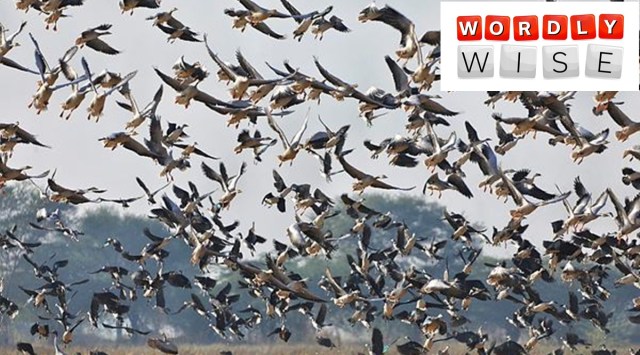Bards, birds and words: Did you know these common terms have avian origins?
Have you ever met a volatile man who chatters like a jay and cajoled him into calming down? Good job. Learn here how all these words are linked to the world of birds.
 Unobtrusively, birds make our surroundings colourful. And as quietly, they have lent their charm to the English vocabulary. (Express file photo)
Unobtrusively, birds make our surroundings colourful. And as quietly, they have lent their charm to the English vocabulary. (Express file photo) Whether it is the cuckoo’s “wandering voice” for William Wordsworth, a kingfisher’s “lovely hues” for W H Davies, an ostrich’s “lofty legs” for Ogden Nash, or a pelican’s beak which can take “food enough for a week” for Dixon Lanier Merritt, birds have always stirred the imagination of bards.
Our feathered friends have coexisted with us from time immemorial, chirping in courtyards and on rooftops, in trees, ponds and fields and enthralling us in folk tales. Unobtrusively, they make our surrounding colourful. And as quietly, they have lent their charm to the English vocabulary. Here are five words that you could be using often in your day to day speech and writing but may not be aware of their avian connect.
In ancient Rome, there were seers who watched the flight of birds and their feeding patterns. Based on their study they made prophecies about the future. The Latin word for such a bird watcher is auspex. In English, auspices (a noun mostly used in plural form) refers to an act of support or help for something. For example: This village hospital was built under the auspices of the district Red Cross branch. Auspicious, an adjective, means signs that something is going to be favourable in the future: An early rain is supposed to be an auspicious start to the sowing season.
Volatile, used as an adjective, has a wide range of usage. It could be used, often disapprovingly, for a person who has mood swings or for a situation which is likely to change suddenly for the worse: The situation in the town is volatile following the desecration of a religious place. In science, it refers to a substance which can easily vaporise or change into gas. It could also mean ‘having the power to fly’. A few centuries back, volatile was used as a noun referring to birds or other creatures which could fly. The connection of volatile to flying comes from Latin volare which means ‘to fly’.
Cajole as a verb means to coax, to persuade with flattery or gentle urging for doing something. It has a French origin in the word cajoler which has the same meaning and also ‘to chatter like a jay’ which is a noisy bright coloured bird. Cajoler itself is linked to Latin caveola (little cage) and Anglo-French gajole (birdcage). The connection to persuasion and flattery, however, is not clear.
Canard, a false report or a piece of news, has an interesting French connection. The word refers to a duck in French. The connection to rumour and untruth comes from a 16th century French idiom vendre des canards a moitie, literally meaning “to half-sell ducks”. Over the ages, it has been used as a euphemism for ‘to fool’ or ‘to cheat’.
Halcyon means peaceful and happy and is used in the context of days in the bygone. According to Greek mythology, Alkyone, the daughter of the God of the winds, became so distraught over her husband Ceyx’s death at sea that she threw herself into the ocean to join him. Moved by the couple’s love, the gods took pity on them by turning them into halcyon birds, a bird identified with the kingfisher. According to the legend, the birds built their nests on the sea, which so charmed Alkyone’s father that he created a period of unusual calm that lasted until the birds’ eggs hatched.
In English, the use of halcyon as an adjective developed in the 16th century and now describes an idyllic time in the past.
Winter in India is also the time when exotic birds from Europe and Central Asia arrive in search of a temporary abode to escape harsh cold conditions of their home. Bird sanctuaries in India become home to 400 species of migratory birds during this time of the year and quite a few of them have reported record arrivals. You could plan a perfect winter vacay to one of them. Meanwhile, I will look for a few interesting bird idioms for the next edition.
Wordly Wise is weekly column by Amitabh Ranjan published every Saturday in the Explained section. Please tweet your feedback to @ieexplained
- 01
- 02
- 03
- 04
- 05






































